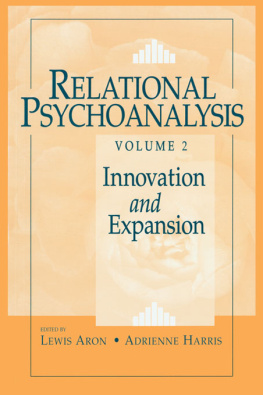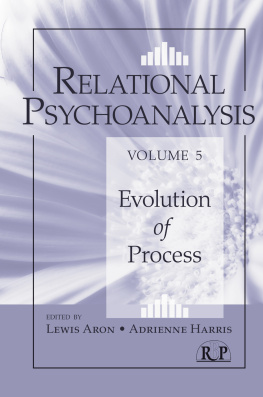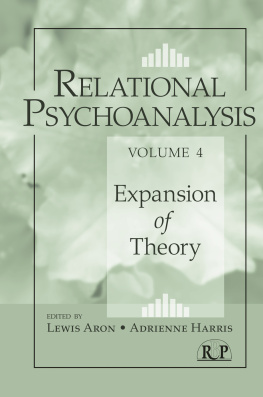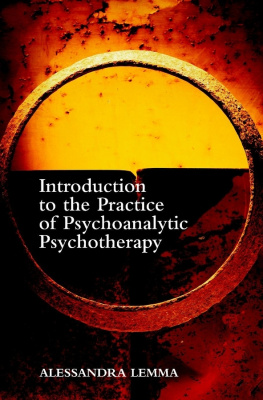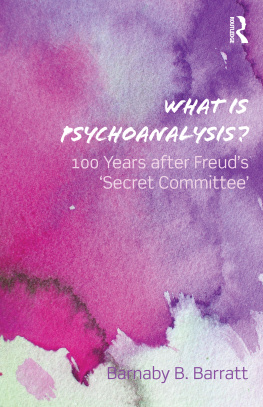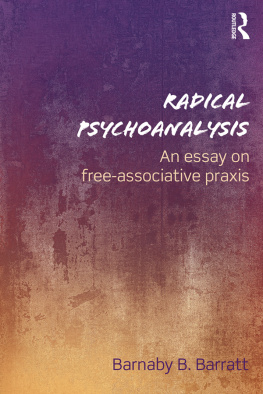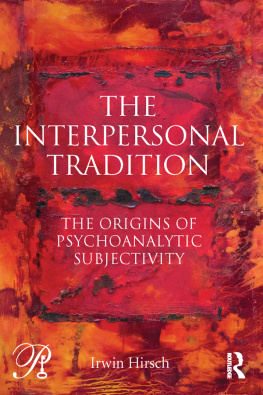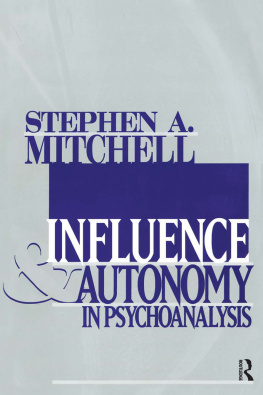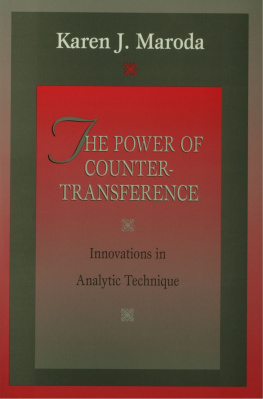
Relational Psychoanalysis
The Emergence of a Tradition
RELATIONAL PERSPECTIVES BOOK SERIES
Volume 14
Relational Psychoanalysis
The Emergence of a Tradition
edited by
Stephen A. Mitchell
Lewis Aron

| Routledge | Routledge |
| Taylor & Francis Group | Taylor & Francis Group |
| 711 Third Avenue | 27 Church Road |
| New York, NY 10017 | Hove |
| East Sussex BN3 2FA |
1999 by Taylor & Francis Group, LLC
Routledge is an imprint of Taylor & Francis Group, an Informa business
International Standard Book Number-13: 978-0-88163-270-5 (Softcover)
Except as permitted by U.S. Copyright Law, no part of this book may be reprinted, reproduced, transmitted, or utilized in any form by any electronic, mechanical, or other means, now known or hereafter invented, including photocopying, microfilming, and recording, or in any information storage or retrieval system, without written permission from the publishers.
Trademark Notice: Product or corporate names may be trademarks or registered trademarks, and are used only for identification and explanation without intent to infringe.
Library of Congress Cataloging-in-Publication Data
Catalog record is available from the Library of Congress
Visit the Taylor & Francis Web site at
http://www.taylorandfrancis.com
and the Routledge Web site at
http://www.routledge.com
For our friends, students, and colleagues
in the relational community.
And with appreciation to the three institutions
in which this community has evolved:
The Division of Psychoanalysis (39) of the
American Psychological Association, Psychoanalytic Dialogues,
and the Relational Track of the New York University
Postdoctoral Program in Psychotherapy and Psychoanalysis.
Contributors
Lewis Aron, Ph.D. (Editor)Director, New York University Postdoctoral Program in Psychotherapy and Psychoanalysis; Coeditor, Psychoanalytic Dialogues; Past-President, Division of Psychoanalysis (39), American Psychological Association.
George E. Atwood, Ph.D.Founding Faculty, Institute for the Psychoanalytic Study of Subjectivity, New York City; Professor of Psychology, Rutgers University.
Jessica Benjamin, Ph.D.Faculty, New York University Postdoctoral Program in Psychotherapy and Psychoanalysis and the Psychoanalytic Studies Program of the New School for Social Research; editorial board, Psychoanalytic Dialogues; Associate Editor, Studies in Gender and Sexuality.
Philip M. Bromberg, Ph.D.Training and Supervising Analyst and Faculty, William Alanson White Psychoanalytic Institute; Clinical Professor of Psychology, New York University Postdoctoral Program in Psychotherapy and Psychoanalysis; Associate Editor, Psychoanalytic Dialogues.
Nancy J. Chodorow, Ph.D.Faculty, San Francisco Psychoanalytic Institute; Professor of Sociology, University of California, Berkeley; and member of editorial boards, International Journal of Psycho-Analysis and Studies in Gender and Sexuality.
Jody Messler Davies, Ph.D.Supervising Analyst and Cochair, Relational Track, New York University Postdoctoral Program in Psychotherapy and Psychoanalysis; Faculty and Supervisor, National Institute for the Psychotherapies; Coeditor, Psychoanalytic Dialogues.
Michael Eigen, Ph.D.Senior Faculty and Control/Training Analyst, National Psychological Association for Psychoanalysis; Faculty and Supervisor, New York University Postdoctoral Program in Psychotherapy and Psychoanalysis.
Mary Gail Frawley-ODea, Ph.D.Clinical Professor and Supervisor, Derner Institute, Adelphi University; Faculty, Minnesota Institute for Contemporary Psychoanalysis; Continuing Education Faculty, National Psychological Association for Psychoanalysis.
Emmanuel Ghent, M.D.Adjunct Professor of Psychology and Supervisor, New York University Postdoctoral Program in Psychotherapy and Psychoanalysis; Faculty and Supervising Analyst, William Alanson White Institute; Associate Editor, Psychoanalytic Dialogues.
Jay R. Greenberg, Ph.D.Training and Supervising Analyst, William Alanson White Institute; Faculty and Supervising Analyst, New York University Postdoctoral Program in Psychotherapy and Psychoanalysis; Editor, Contemporary Psychoanalysis.
Adrienne Harris, Ph.D.Faculty and Supervisor, New York University Postdoctoral Program in Psychotherapy and Psychoanalysis; Associate Editor, Psychoanalytic Dialogues and Studies in Gender and Sexuality.
Irwin Z. Hoffman, Ph.D.Supervising Analyst and Faculty, Chicago Center for Psychoanalysis; Lecturer in Psychiatry, University of Illinois College of Medicine; editorial boards, Psychoanalytic Dialogues and International Journal of Psycho-Analysis.
Stephen A. Mitchell, Ph.D. (Editor)Training and Supervising Analyst, William Alanson White Institute; Faculty, New York University Postdoctoral Program in Psychotherapy and Psychoanalysis; Coeditor, Psychoanalytic Dialogues.
Thomas H. Ogden, M.D.Co-director, the Center for the Advanced Study of the Psychoses; Supervising and Training Analyst, Psychoanalytic Institute of Northern California; Faculty, San Francisco Psychoanalytic Institute.
Stuart A. Pizer, Ph.D.Supervising Analyst and Faculty, Massachusetts Institute for Psychoanalysis; Faculty, Psychoanalytic Institute of Northern California, San Francisco; Clinical Instructor in Psychology, Harvard Medical School; Contributing Editor, Psychoanalytic Dialogues.
Owen Renik, M.D.Training and Supervising Analyst, San Francisco Psychoanalytic Institute; Editor-in-Chief, Psychoanalytic Quarterly; Chairman, Program Committee, American Psychoanalytic Association.
Charles Spezzano, Ph.D.Training and Supervising Analyst, Psychoanalytic Institute of Northern California; Contributing Editor, Psychoanalytic Dialogues.
Donnel B. Stern, Ph.D.Supervising Analyst and Faculty, William Alanson White Institute, Manhattan Institute of Psychoanalysis, Institute for Contemporary Psychotherapy.
Robert D. Stolorow, Ph.D.Faculty, Training and Supervising Analyst, Institute of Contemporary Psychoanalysis, Los Angeles; Faculty, Institute for the Psychoanalytic Study of Subjectivity; Clinical Professor of Psychiatry, UCLA School of Medicine.
Preface
Traditions cannot be founded or self-consciously created; they can only be retrospectively, self-reflectively discovered. Something works well or was exciting, or felt good, and you want to do it again. People become aware that they have been doing certain things the same way, planning activities, using concepts, over and over again. After a while, a sense of tradition accrues to events or approaches: an annual dinner; a form of celebration of a particular holiday; and certain concepts or ways of thinking, like evoking common heroes or heroines, retelling old stories, or sharing time-proven approaches to new problems. Traditions become meaningful when they add a richness and vitality to experience. Some repetitions are merely lifeless perseverations. But meaningful traditions become touchstones, adding a depth and sense of connectedness that helps generate fresh thoughts and feelings.
Next page

